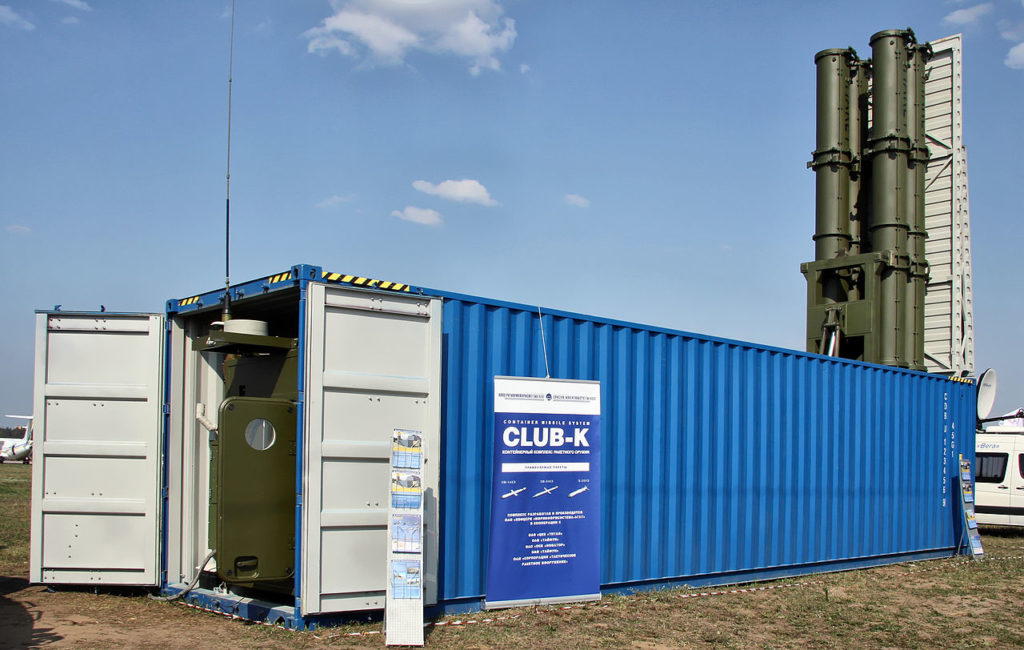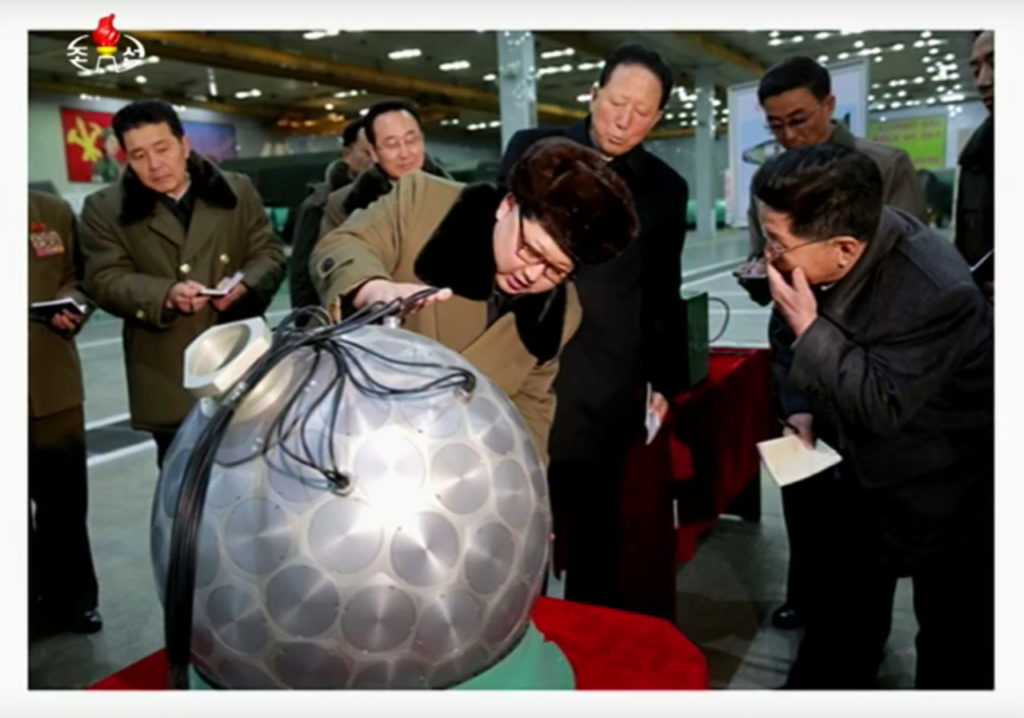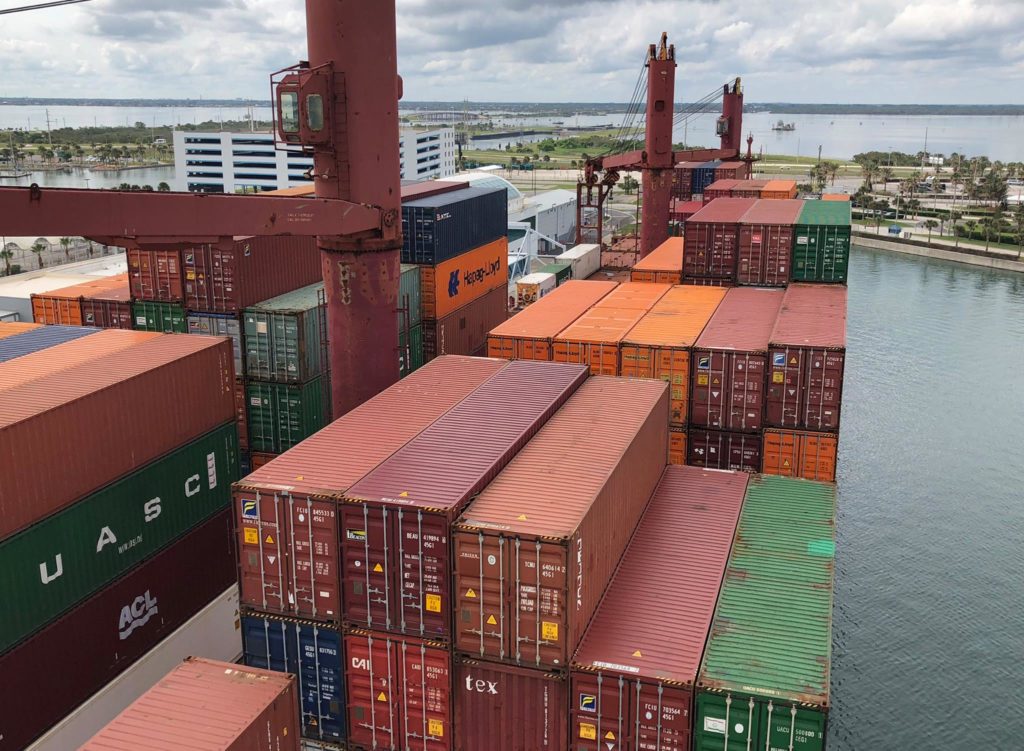
IMAGE: CLUB-K Container Cruise Missile System on display at the International Aviation and Space Show (MAKS) 2011, Moscow, Russia, August 16, 2011 (Photographer: Vitaly V. Kuzmin, used under Wikimedia Commons)
By Alan Jones and Mary Fanning
Gulftainer, the UAE-based ports company operating Florida’s Port Canaveral cargo container terminal despite the company’s ties to Saddam Hussein’s nuclear WMD program, is in a joint venture with Russian Technologies (Rostec). Rostec exports Russia’s Trojan Horse Club-K container cruise missile weapons system.
The joint venture is called Gulftainer Russian Technologies.
Rostec exports the ‘doomsday box’ Club-K container cruise missile launcher through its Rosoboronexport arms export division.
Rostec and Rosoboronexport are Russian state-owned companies controlled by former KGB officials.
Club-K is a modular advanced weapons system.
https://www.youtube.com/watch?v=mbUU_9bOcnM
Club-K ‘universal launching modules’ are “housed in standard marine containers,” indistinguishable from standard shipping containers according to Rosoboronexport.
The Club-K gives “any merchant vessel the capability to wipe out an aircraft carrier” according to Reuters. “It’s a carrier-killer,” Robert Hewson of Jane‘s Defense Weekly told Reuters. “If you are hit by one or two of them, the kinetic impact is vast…it’s horrendous.”
The Club-K can be armed with four Kalibr anti-ship or land-attack cruise missiles that can be satellite-guided at supersonic speeds toward multiple targets.
GULFTAINER CO-OWNER HAMID JAFAR AND DR. JAFAR DHIA JAFAR, HIS BROTHER AND BUSINESS PARTNER, FUNDED AND DIRECTED SADDAM’S WMDs
Gulftainer co-owner Hamid Jafar is the brother and business partner of physicist Dr. Jafar Dhia Jafar, Saddam’s rogue nuclear WMD mastermind.
Hamid Jafar and Gulftainer’s affiliate Crescent Petroleum were under investigation by the U.S. Treasury Department and several congressional committees for operating a “front company” for Saddam in a scheme called ‘Oil-For-Superweapons.’ The proceeds were to fund Dr. Jafar’s massive secret nuclear weapons program.
Dr. Jafar served as Presidential Adviser to Saddam Hussein and Deputy Defense Minister while directing Saddam’s uranium enrichment and nuclear bomb programs. Dr. Jafar also oversaw technology transfer and procurement operations for Iraq’s chemical, biological, and nuclear WMD programs according to CIA documents.
Dr. Jafar’s name was on CENTCOM’s Operation Iraqi Freedom “BLACKLIST” of Saddam regime officials whom Coalition Forces were granted pre-approval to engage as legitimate military targets.
Dr. Jafar reportedly developed an Iraqi miniaturized nuclear weapon, the so-called ‘Beach Ball.’
An apparent miniaturized nuclear warhead pictured on North Korean TV with ‘Rocket Man’ Kim Jong-un appears strikingly similar in design to Dr. Jafar’s ‘Beach Ball.’

North Korean leader Kim Jong-un showing off an apparent miniaturized nuclear weapon during a 2016 Korean Central Television broadcast.
GULFTAINER TAKES OVER PORT CANAVERAL CARGO TERMINAL IN SECRET ‘PROJECT PELICAN’ OPERATION — CFIUS BYPASSED

Image: PORT CANAVERAL, FL – Containers aboard Hapag-Lloyd’s Washington Express, a U.S. flagged container ship that berthed at Gulftainer’s Canaveral Cargo Terminal in November 2017 (Source: Canaveral Port Authority Facebook)
As previously reported by Breitbart, Gulftainer’s GT USA was awarded a 35-year cargo container terminal lease at Port Canaveral in 2014 under the Obama administration in a secretly-negotiated deal code-named ‘Project Pelican.’
Breitbart also reported on ties between Gulftainer and the Clinton Foundation, revealed by Wikileaks.
Treasury Secretary Jacob ‘Jack’ Lew declined to order a CFIUS National Security Threat Analysis of the transaction as mandated under the Foreign Investment National Security Act of 2007 (FINSA). FINSA was enacted after the 2006 Dubai Ports World debacle.
Aimen Mir was the Treasury Department’s CFIUS staff chairperson in 2014 when the Gulftainer Port Canaveral deal closed. Mir was two-time president of Muslim Youth of North America (MYNA), the youth wing of the Islamic Society of North America (ISNA).
EMP EXPERT DR. PRY: IRAN PURCHASED RUSSIA’S CLUB-K
In 2014 EMP expert Dr. Peter Vincent Pry “revealed that Iran recently purchased Russia’s Club-K missile launcher” according to a “Washington Examiner” report.
“Iran has demonstrated the capability to launch a missile off a freighter. Dr. Peter Vincent Pry said. Dr. Pry is the Executive Director of the EMP Task Force on National and Homeland Security. “The Club-K, if armed with a nuclear warhead, could be used to execute an EMP attack” he warned.
ROSTEC CEO AND GULFTAINER’S JOINT VENTURE PARTNER PROMINVEST UNDER U.S. SANCTIONS
Rostec is the Russian state-owned weapons and technology firm established by Putin in 2007 states Reuters. Rostec’s CEO is a former Putin KGB colleague. Club-K exporter Rosoboronexport is controlled by a former KGB special forces operative.
Rostec’s CEO and Rostec’s bank Prominvest are under U.S. sanctions and identified as Specially Designated Nationals (SDNs). “U.S. persons are generally prohibited from dealing with” SDNs states the U.S. Treasury Department.
Rosoboronexport’s “activities are largely a state secret” claims the Wall Street Journal.
Gulftainer announced “a major joint venture agreement with Prominvest, the financial and investment arm of” Rostec in a 2010 press release.
Prominvest is Rosoboronexport’s arms export bank states Rostec.
Putin and Dr. Jafar’s nephew Gulftainer Vice Chairman Badr Jafar were photographed at the joint venture signing.
Badr Jafar visited the White House in 2014, weeks before the signing of the secret ‘Project Pelican’ deal.
Gulftainer, under its Rostec joint-venture, operates Russia’s Ust Luga Baltic Sea Port, one of twelve Russian ports designated for shipment of nuclear materials. Gulftainer invested $275 million in the half billion dollar joint venture with Prominvest.
President Obama lifted sanctions on Rosoboronexport in 2010 during his ‘Russia reset’ according to the Washington Times.